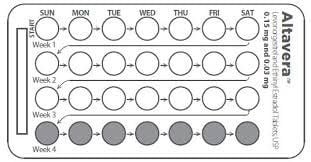This is an automatically translated article.
Enzyme-inducing drugs, including antivirals, may decrease the effectiveness of oral contraceptives. Patients should be counseled about the risk of drug interactions, failure rates, and other contraceptive methods. The following is a summary of some studies on antiviral drug and oral contraceptive interactions.
1. The first study
The US National Center for Biotechnology Information (NCBI) has compiled studies of women using concomitant hormonal contraceptives and antiretroviral drugs (ARVs). Accordingly, most antiretroviral drugs, whether used for treatment or prevention, have limited interactions with hormonal contraceptives, with the exception of efavirenz.
Although the contraceptive injection Depo-provera (medroxyprogesterone acetate) is not affected, data suggest that combination antiretroviral therapy containing efavirenz may reduce the contraceptive effectiveness of implanted methods and combination hormone pills.
In fact, despite the interaction of antiretroviral drugs and oral contraceptives, in general, the contraceptive implant is still very effective. The plasma concentrations and efficacy of antiretrovirals are not affected by hormonal contraceptives.
From this it can be concluded that women who are taking ARV drugs (both for treatment and prevention) still have adequate access to a full range of hormonal contraceptives. However, the physician should advise the patient about the unplanned pregnancy rate of all contraceptive methods. This allows them to make informed choices for themselves.

Một số thuốc kháng virus có thể làm tác dụng của thuốc tránh thai
2. Second study
Statistics show that women of childbearing age account for 20-25% of the HIV-infected community. Meanwhile, HIV patients need to take ARV drugs for treatment. Furthermore, most of these women also do not qualify for a healthy pregnancy. Therefore, it is important to identify antiviral drug and oral contraceptive interactions. From there, provide guidance on dose adjustment for the doctor.
A clinical study determined the effect of the antiviral drug vicriviroc, alone or in combination with ritonavir, on the pharmacokinetics of combined oral contraceptives. In addition, this study monitored the safety and tolerability of vicriviroc plus combined oral contraceptives with/without ritonavir.
Female subjects were randomly divided into 2 groups and treated for 2 menstrual cycles. During cycle 1, all were given birth control pills only according to the standard 28-day pack instructions. On the first 10 days of cycle 2:
Group 1 received oral contraceptives + vicriviroc; Group 2 received oral contraceptives + ritonavir; For the next 11 days, both groups received oral contraceptives + vicriviroc + ritonavir. Blood samples were collected within 24 hours of drug administration on predetermined days.
Results showed that vicriviroc had little effect on the pharmacokinetics of combined oral contraceptives. While ritonavir used alone or in combination with vicriviroc has been associated with decreased effectiveness of oral contraceptives.

Nhiều phụ nữ nhiễm HIV không đủ điều kiện để mang thai do đó nên sử dụng thuốc tránh thai
3. Third study
The aim of this study was to examine drug interactions between protease inhibitor (PI)-based regimens (including lopinavir/ritonavir) and two forms of oral contraceptives (Ortho Evra and Ortho Novum oral contraceptives) in HIV-infected women.
Both antiretroviral drugs and oral contraceptives are metabolized in the same way, which significantly reduces the effectiveness of oral contraceptives and limits contraceptive options for HIV-infected women. Women who are on strong antiretroviral therapy need more effective hormonal contraceptives to prevent unwanted pregnancy.
Ortho Evra is a contraceptive patch that was approved by the FDA in 2001. Because it is used as a contraceptive patch that is worn on the skin, it may bypass the normal metabolic pathway. Furthermore, the use of Ortho has a higher compliance rate than oral contraceptives. As a result, the patch becomes a viable birth control option for HIV-infected women on antiretroviral therapy.
The study will examine the interaction between a PI-based regimen containing LPV/r and two forms of oral contraceptives in HIV-infected women. For 6 weeks, the participants will be divided into two groups, depending on their ART regimen at the start of the study, and they will also be stratified by age. All will begin with the Ortho Evra contraceptive patch, then undergo a physical exam, cervical smear, pregnancy test, viral load test and blood draw for periodic analysis. This study is still being carried out and analyzed before final results are available.
In addition to the above studies, most experts agree that antiretroviral drugs increase the metabolism of estrogen and progesterone, thereby reducing the effectiveness of oral contraceptives. Antiviral drug and oral contraceptive interactions are still present in newer generation liver enzyme inducers. Therefore, when taking antiretroviral drugs, women should be counseled about the risk of unwanted pregnancy and instructed on the use of additional contraception.
Please dial HOTLINE for more information or register for an appointment HERE. Download MyVinmec app to make appointments faster and to manage your bookings easily.
References: ncbi.nlm.nih.gov, pubmed.ncbi.nlm.nih.gov, clinicaltrials.gov













